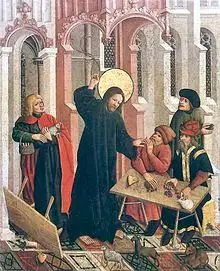bank, banknote, bankruptcy
A bank is a financial institution that accepts deposits from the public and creates a demand deposit while simultaneously making loans. Lending activities can be directly performed by the bank or indirectly through capital markets. 银行是接受公众存款并在发放贷款的同时创造活期存款的金融机构。贷款活动可以由银行直接进行,也可以通过资本市场间接进行。
In addition to other regulations intended to ensure liquidity, banks are generally subject to minimum capital requirements based on an international set of capital standards, the Basel Accords. 除了旨在确保流动性的其他监管外,银行通常还受到基于一套国际资本标准《巴塞尔协议》的最低资本要求的约束。
Banking in its modern sense evolved in the fourteenth century in the prosperous cities of Renaissance Italy but in many ways functioned as a continuation of ideas and concepts of credit and lending that had their roots in the ancient world. 现代意义上的银行业于14世纪在意大利文艺复兴时期的繁荣城市发展起来,但在许多方面,银行业是起源于古代世界的信贷理念和概念的延续。
The cleansing of the Temple narrative tells of Jesus expelling the merchants and the money changers from the Temple, and is recounted in all four canonical gospels of the New Testament. The scene is a common motif in Christian art. 《净化圣殿》的叙事讲述了耶稣驱逐商人和货币兑换商出圣殿的故事,并在《新约》的四部经典福音中进行了叙述。该场景是基督教艺术中常见的主题。This 15th-century painting depicts [描画] money-dealers [钱贩] at a banca (bench) during the Cleansing of the Temple.

The word bank was taken Middle English from Middle French banque, from Spanish banca,from Old Italian banca, meaning "table", from Old High German banc, bank "bench, counter". [长凳,柜台] Benches were used as makeshift desks or exchange counters during the Renaissance by Florentine bankers, who used to make their transactions atop desks covered by green tablecloths. 在文艺复兴时期,佛罗伦萨的银行家们将长椅用作临时办公桌或兑换柜台,他们通常在铺着绿色桌布的桌子上进行交易。
Banks' activities can be divided into:
- Retail banking, dealing directly with individuals and small businesses;
- Business banking, providing services to mid-market business;
- Corporate banking, directed at large business entities;
- Private banking, providing wealth management services to high-net-worth [高净值] individuals and families;
- Investment banking, relating to activities on the financial markets. [投行倒不是投机银行的简称]
Fractional reserve banking and the issue of banknotes emerged in the 17th and 18th centuries. Merchants started to store their gold with the goldsmiths of London, who possessed private vaults, and who charged a fee for that service. In exchange for each deposit of precious metal, the goldsmiths issued receipts certifying the quantity and purity of the metal they held as a bailee; these receipts could not be assigned, only the original depositor could collect the stored goods. Gradually the goldsmiths began to lend the money out on behalf of the depositor, and promissory notes (which evolved into banknotes) were issued for money deposited as a loan to the goldsmith.
部分准备金银行和纸币的发行出现在17世纪和18世纪。商人们开始将黄金存放在伦敦的金匠那里,这些金匠拥有私人金库,并为此收取费用。作为每一笔贵重金属存款的交换,金匠签发收据,证明他们作为受托人持有的金属的数量和纯度;这些收据无法转让或过户,只有原始储户才能取走储存的货物。渐渐地,金匠开始代表储户出借这些钱,而本票(后来演变成钞票)则是为作为贷款存入金匠的钱而发行的。
The word bankruptcy is derived from Italian banca rotta, literally meaning "broken bench" but more idiomatically "broken bank", since bankers traditionally dealt from wooden benches. A folk etymology alleges that Italian bankers' benches were smashed if they defaulted on payment, but this is often dismissed as a legend. 破产一词源于意大利语banca rotta,字面意思是“破板凳”,但更惯用的说法是“破银行”,因为银行家们传统上是通过木制板凳进行交易。一个民间词源声称,如果意大利银行家拖欠付款,他们的长椅就会被砸碎,但这通常被视为一个传说而不予采信。
Bankruptcy is a legal process through which people or other entities who cannot repay debts to creditors may seek relief from some or all of their debts. In most jurisdictions, bankruptcy is imposed by a court order, often initiated by the debtor. Bankrupt is not the only legal status that an insolvent person may have, and the term bankruptcy is therefore not a synonym for insolvency. 破产是一种法律程序,无法向债权人偿还债务的个人或其他实体可以通过该程序寻求部分或全部债务的减免。在大多数司法管辖区,破产是由法院命令实施的,通常由债务人发起。破产并不是无力偿还者可能拥有的唯一法律状态(包括蹲监狱?),因此破产一词也不是无力偿还的同义词。Bankruptcy fraud is a white-collar crime. 破产欺诈是白领犯罪。
In Ancient Greece, bankruptcy did not exist. If a man owed and he could not pay, he and his wife, children or servants were forced into "debt slavery", until the creditor recouped losses through their physical labour. 在古希腊,破产并不存在。如果一个人欠债而无力偿还,他和他的妻子、孩子或仆人就会被迫成为“债务奴隶”,直到债权人通过体力劳动弥补损失。[古希腊男人一定很爱自己的老婆:-)] 曲婉婷,你妈无期_腾讯新闻 "2019年1月,曲婉婷发布了一条微博……"




 浙公网安备 33010602011771号
浙公网安备 33010602011771号